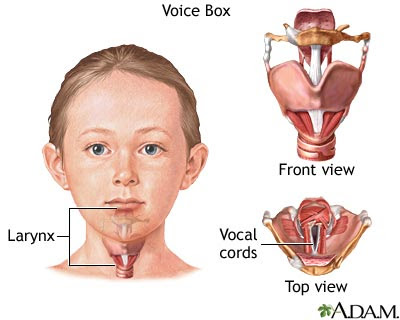skip to main |
skip to sidebar
Tips to Prevent Voice Problems

- Limit your intake of drinks that include alcohol or caffeine. These act as diuretics (substances that increase urination) and cause the body to lose water. This loss of fluids dries out the voice. Alcohol also irritates the mucous membranes that line the throat.
- Drink plenty of water. Six to eight glasses a day is recommended.
- Don't smoke and avoid second-hand smoke. Cancer of the vocal folds is seen most often in individuals who smoke.
- Practice good breathing techniques when singing or talking. It is important to support your voice with deep breaths from the diaphragm, the wall that separates your chest and abdomen. Singers and speakers are often taught exercises that improve this breath control. Talking from the throat, without supporting breath, puts a great strain on the voice.
- Avoid eating spicy foods. Spicy foods can cause stomach acid to move into the throat or esophagus (reflux).
- Use a humidifier in your home. This is especially important in winter or in dry climates. Thirty percent humidity is recommended.
- Try not to overuse your voice. Avoid speaking or singing when your voice is hoarse.
- Wash your hands often to prevent colds and flu.
- Include plenty of whole grains, fruits, and vegetables in your diet. These foods contain vitamins A, E, and C. They also help keep the mucus membranes that line the throat healthy.
- Do not cradle the phone when talking. Cradling the phone between the head and shoulder for extended periods of time can cause muscle tension in the neck.
- Exercise regularly. Exercise increases stamina and muscle tone. This helps provide good posture and breathing, which are necessary for proper speaking.
- Get enough rest. Physical fatigue has a negative effect on voice.
- Avoid talking in noisy places. Trying to talk above noise causes strain on the voice.
- Avoid mouthwash or gargles that contain alcohol or irritating chemicals. If you still wish to use a mouthwash that contains alcohol, limit your use to oral rinsing. If gargling is necessary, use a salt water solution.
- Avoid using mouthwash to treat persistent bad breath. Halitosis (bad breath) may be the result of a problem that mouthwash can't cure, such as low grade infections in the nose, sinuses, tonsils, gums, or lungs, as well as from gastric reflux from the stomach.
- Consider using a microphone. In relatively static environments such as exhibit areas, classrooms, or exercise rooms, a lightweight microphone and an amplifier-speaker system can be of great help.
- Consider voice therapy. A speech-language pathologist who is experienced in treating voice problems can provide education on healthy use of the voice and instruction in proper voice techniques.

No comments:
Post a Comment